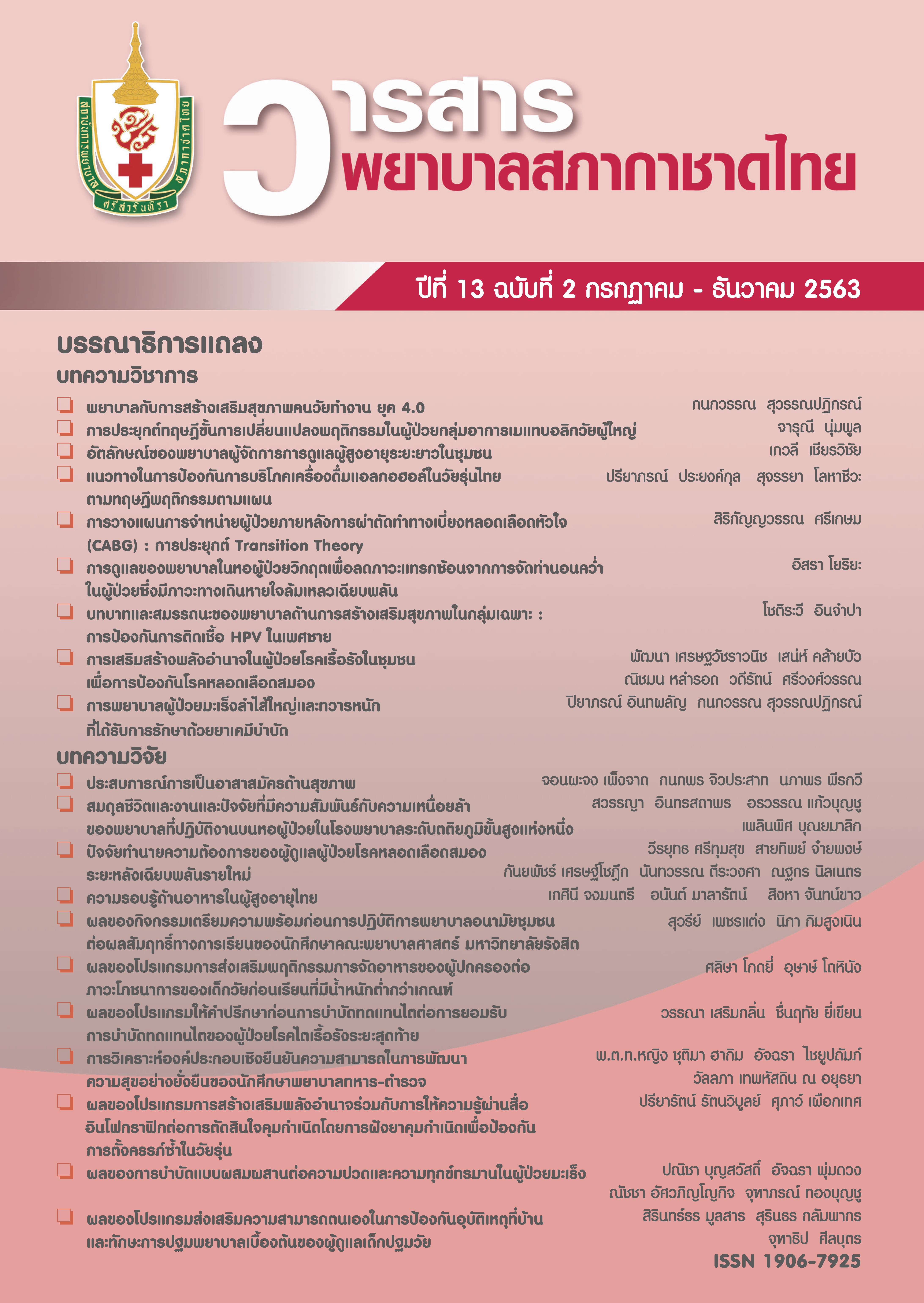Empowerment of Patients with Chronic Disease in Community Stroke Prevention
Keywords:
empowerment, stroke, patients with chronic diseaseAbstract
Stroke is a leading cause of death and long-term disability. Major risk factors are caused by inappropriate health behaviors that cause chronic disease. The most important responsibility of health personnel in primary health care is stroke prevention. Therefore, supporting and promoting the ability of patients with chronic disease to think critically and to make decisions in response to their own needs should enhance healthy behaviors in stroke prevention. Gibson's Empowerment (1993) is a process based on mutual participation and interaction. It consists of 4 steps: 1) discovering reality, 2) critical reflection, 3) taking charge, and 4) holding on. This concept for stroke prevention in patients with chronic disease will help to improve the quality of life and promote self-confidence in order to change behavior and satisfaction in daily life. The purpose of this article is to apply Gibson’s empowerment process as a guideline for organizing health activities for stroke prevention in patients with chronic disease in primary health care services.
References
2. Division of Non communicable Disease, Ministry of Public Health, Thailand. CBI NCDs. Nonthaburi: Ministry of Public Health; 2017. (in Thai)
3. Boehme AK, Esenwa C, Elkind MSV. Stroke risk factors, genetics, and prevention. Circ Res 2017;120(3):472–95.
4. Bravo P, Edwards A, Barr PJ, Scholl I, Elwyn G, McAllister M. Conceptualising patient empowerment: a mixed methods study. BMC Health Service Research. 2015;15:252. doi 10.1186/s12913-015-0907-z
5. Gibson CH. A concept analysis of empowerment. J Adv Nurs 1991;16(3):354-61.
6. Wahlin I. Empowerment in critical care – a concept analysis. Scand J Caring Sci 2017;31(1):164-74.
7. Holmstrom I, Röing M. The relation between patient-centeredness and patient empowerment: a discussion of concepts. Patient Educ Couns 2010;79(2):167-72.
8. Cooper H, Booth K, Fear S, Gill G. Chronic disease patient education: lessons from meta-analyses. Patient Educ Couns 2001;44(2):107-17.
9. Funnell MM. Patient empowerment: What does it really mean? Patient Educ Couns 2016;99(12):1921-22.
10. Gibson CH. A study of empowerment in mothers of chronically ill children [Thesis]. Boston: Boston College;1993.
11. Pickham D, Valdez A, Demeestere J, Lemmens R, Diaz L, Hopper S, et al. Prognostic Value of BEFAST vs. FAST to Identify Stroke in a Prehospital Setting. Prehosp Emerg Care 2019;23(2):195-200.
12. Goldstein LB, Sacco RL. Stroke pathophysiology, diagnosis, and management: preventing a first stroke. 6th ed. Beijing: Elsevier Health Sciences; 2016
13. Llewwllyn WA. Webster’s ninth new collegiate dictionary. Springfield, MA: Merriam-Webter; 1989.
14. Ellis-Stoll CC, Popkess-Vawter S. A concept analysis on the process of empowerment. Adv Nurs Sci 1998;(21):62–8.
15. Weisbeck S, Lind C, Ginn C. Patient empowerment: an evolutionary concept analysis. Int J Caring Sci [Internet]. 2019 [cited 2020 Apr 7];12(2):1148–55. Available from: https://pdfs.semanticscholar.org/6632/549bfb4ba6d5b46f5786cdb8250ecec996bb.pdf
16. Castro EM, Van Regenmortel T, Vanhaecht K, Sermeus W, Van Hecke A. Patient empowerment, patient participation and patient centeredness in hospital care: a concept analysis based on a literature review. Patient Educ Couns 2016;99(12):1923-39.
17. Hagiwara E, Futawatari T. A concept analysis: empowerment in cancer patients. The Kitakanto Medical Journal 2013;63(2):165-74.
18. Akpotor ME, Johnson A. Client empowerment: a concept analysis. Int J Caring Sci 2018;11(2):743-50.
19. Kayser L, Karnoe A, Duminski E, Somekh D, Vera-Muñoz C. A new understanding of health related empowerment in the context of an active and healthy ageing. BMC Health Serv Res 2019;19:242.
Downloads
Published
Issue
Section
License
เนื้อหาบทความหรือข้อคิดเห็นต่างๆ ในวารสารพยาบาลสภากาชาดไทยนี้ เป็นความคิดเห็นของผู้เขียนบทความ ไม่ใช่ความเห็นของกองบรรณาธิการ หรือสถาบันการพยาบาลศรีสวรินทิรา สภากาชาดไทย






